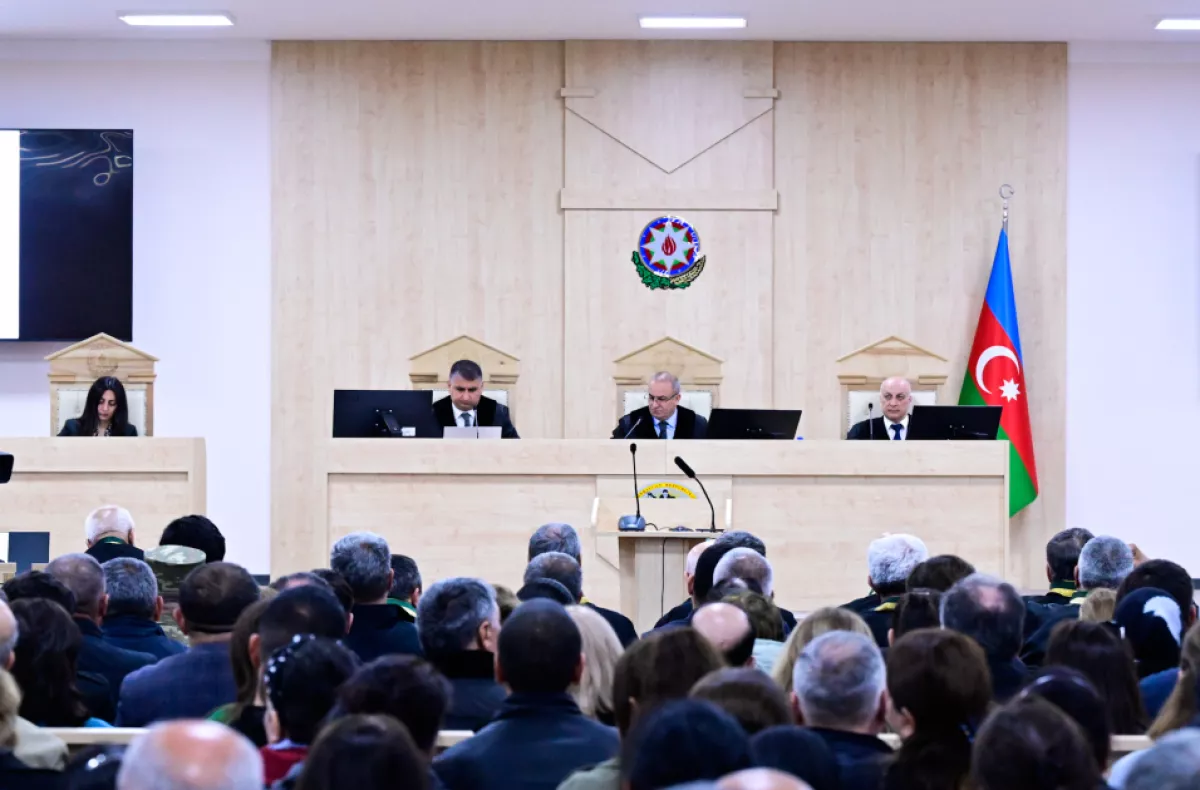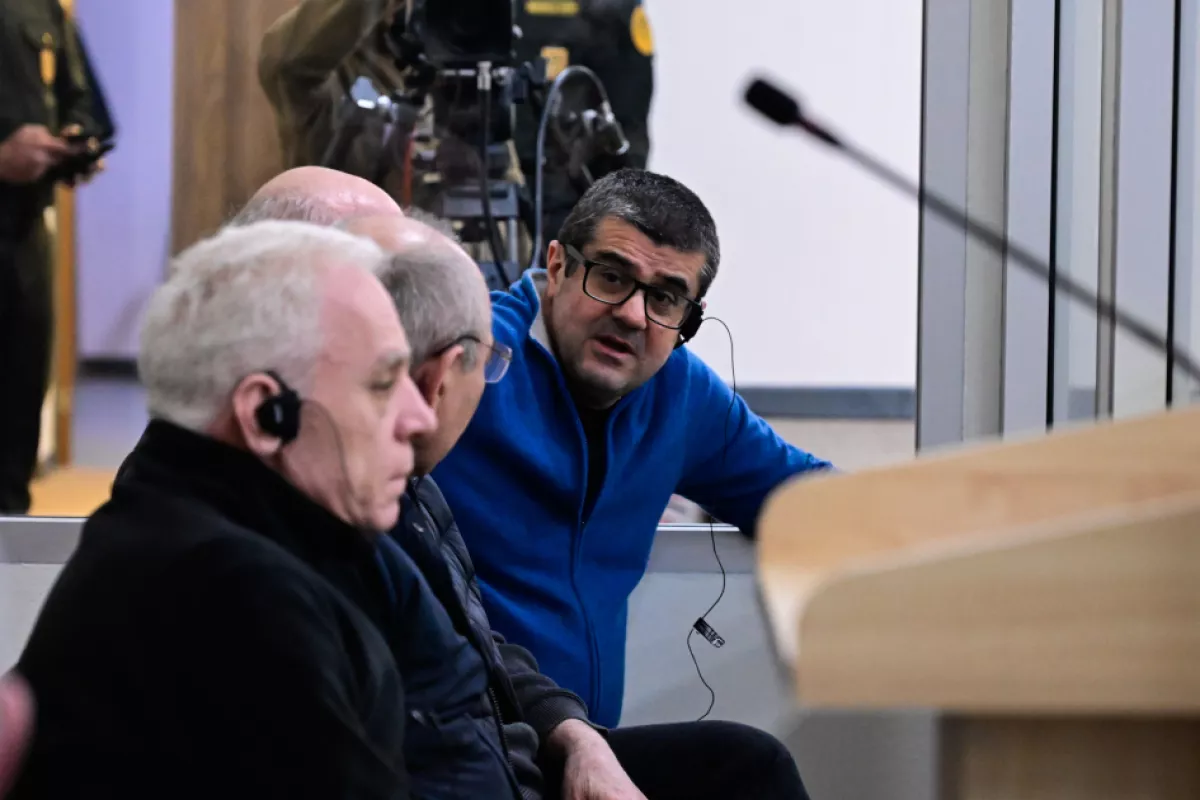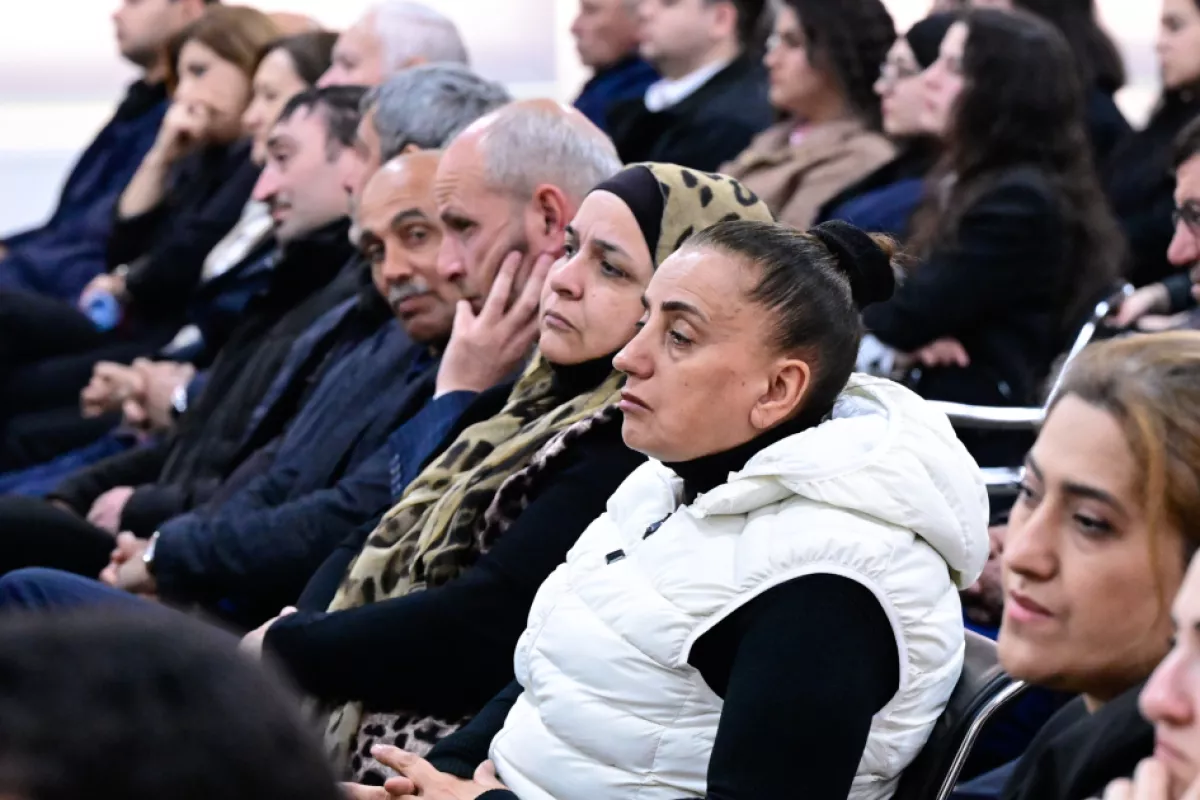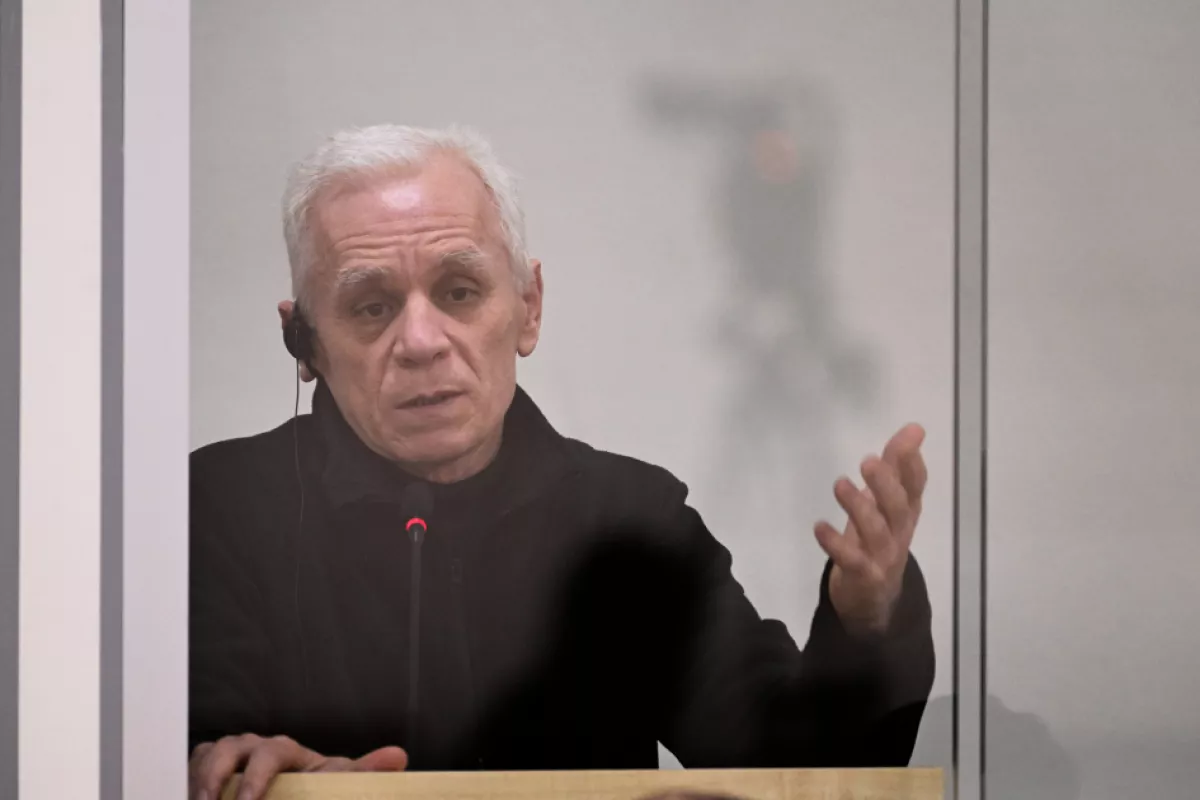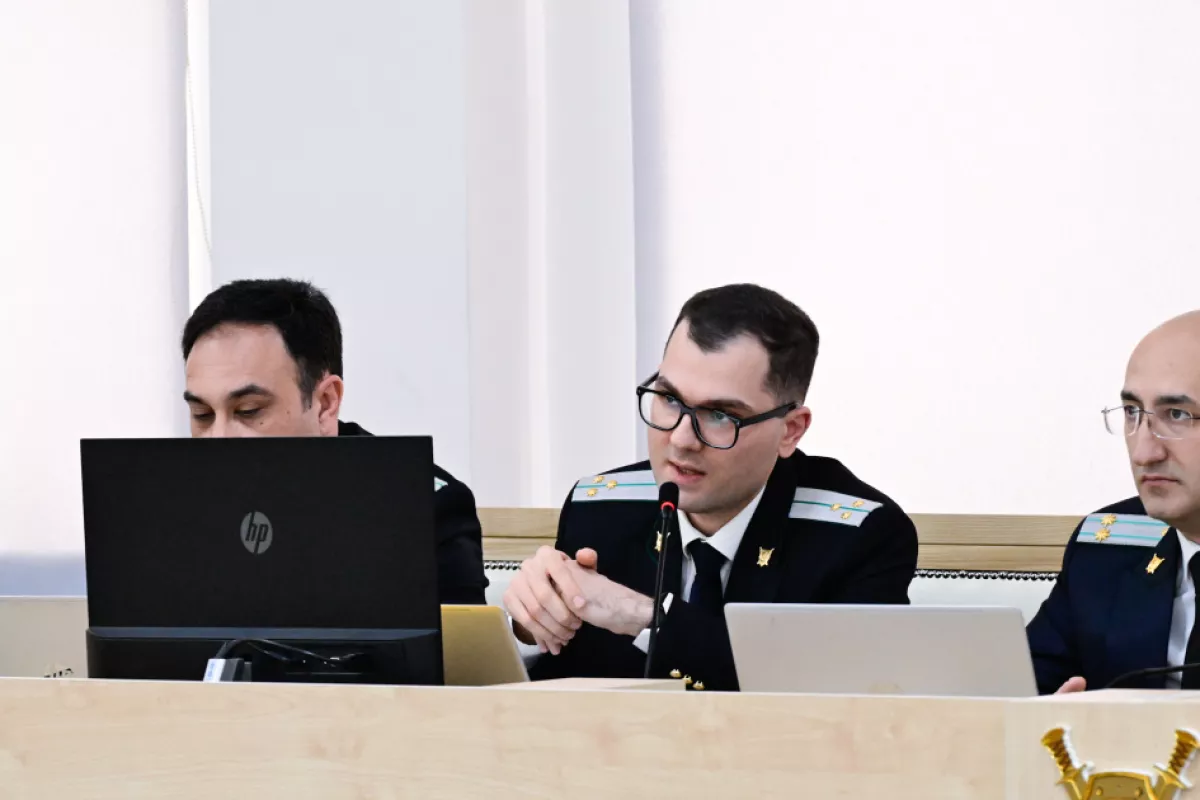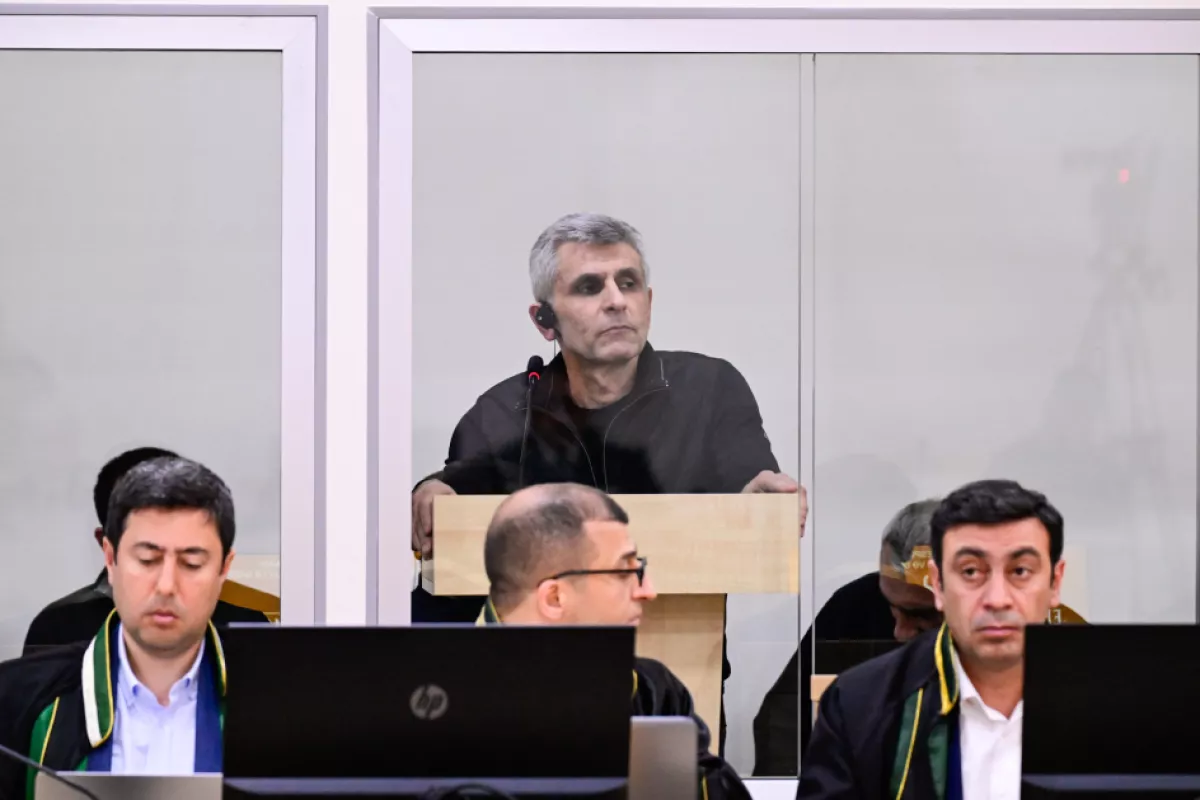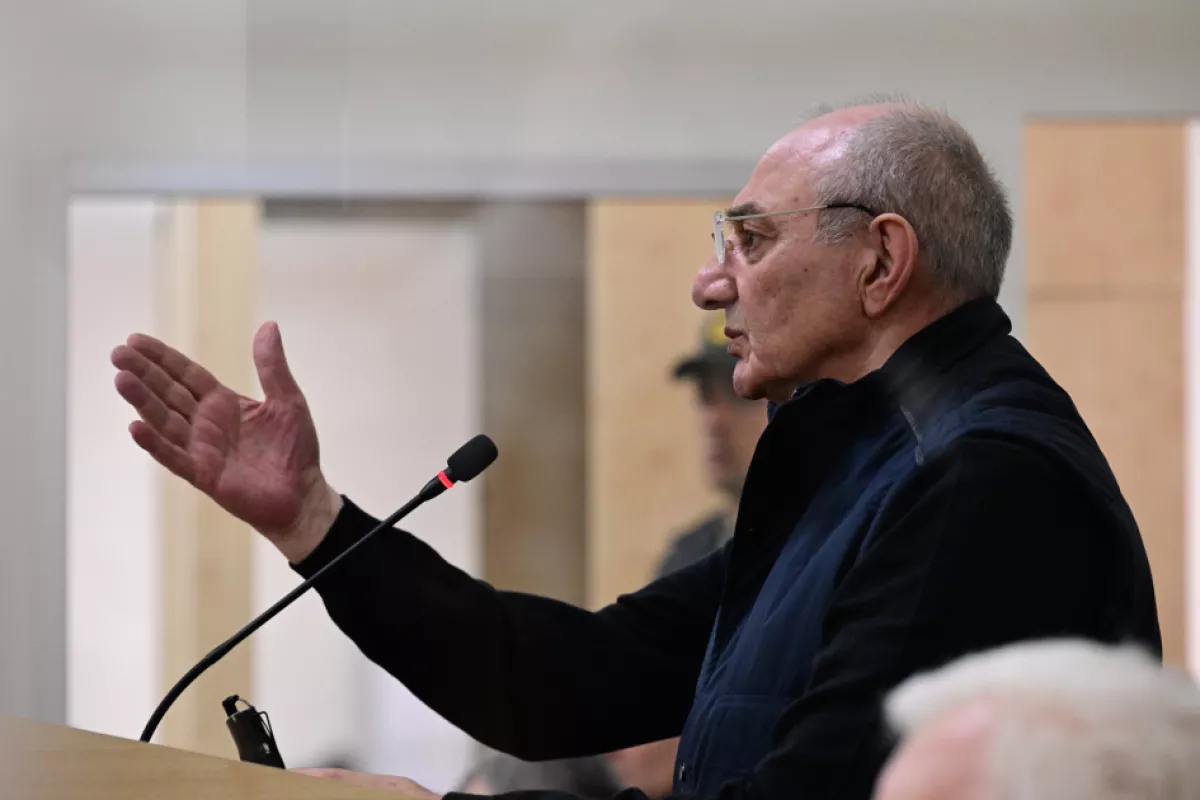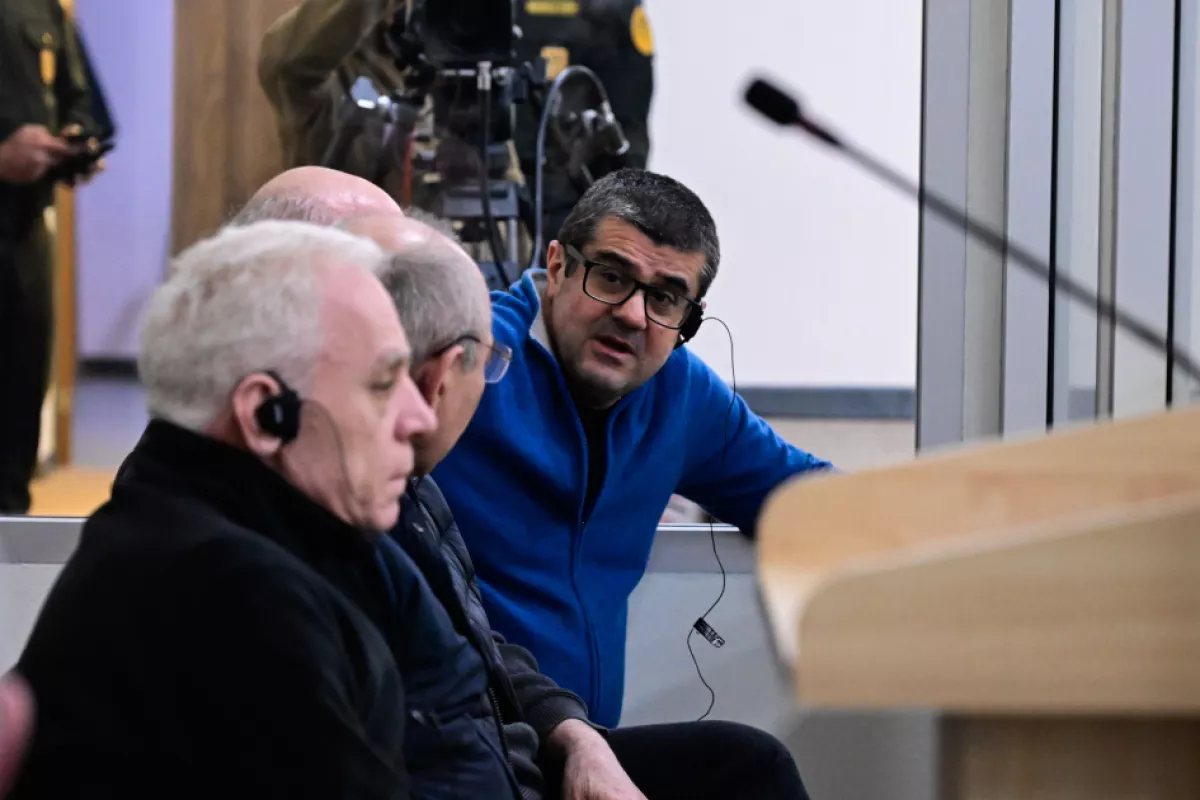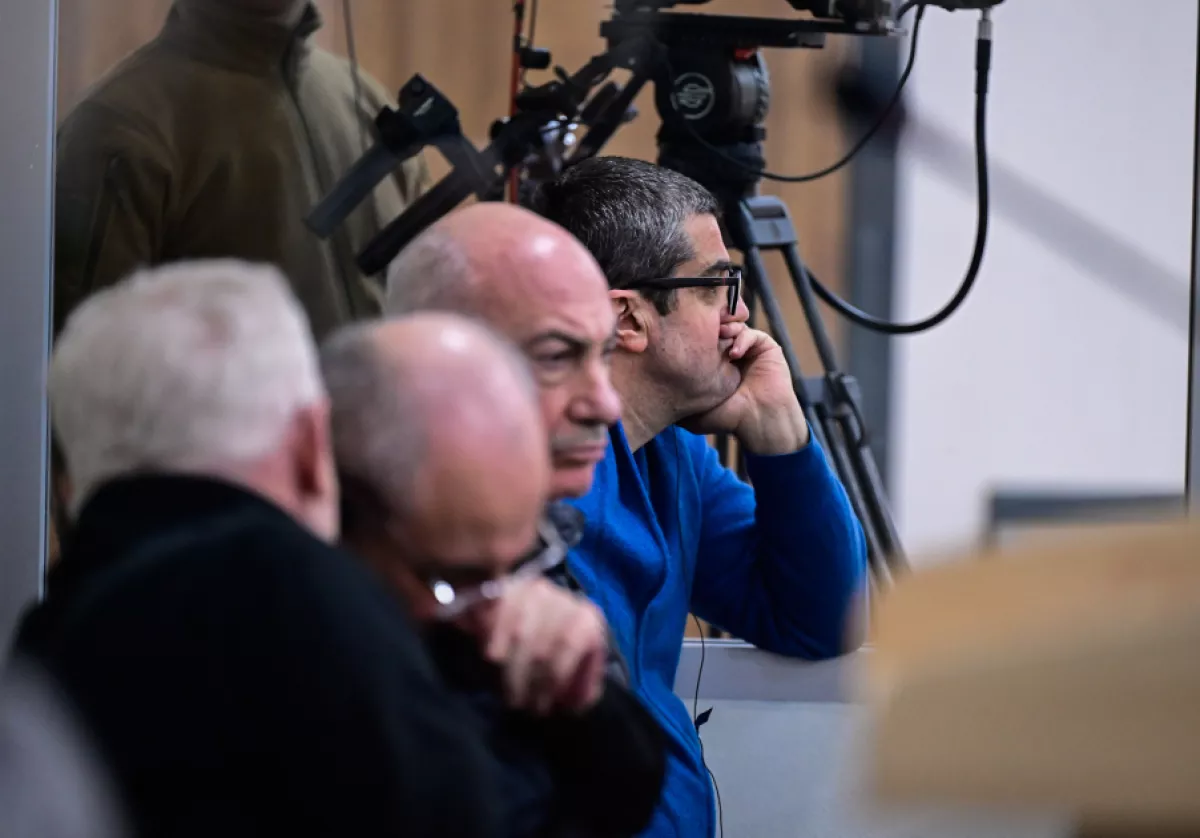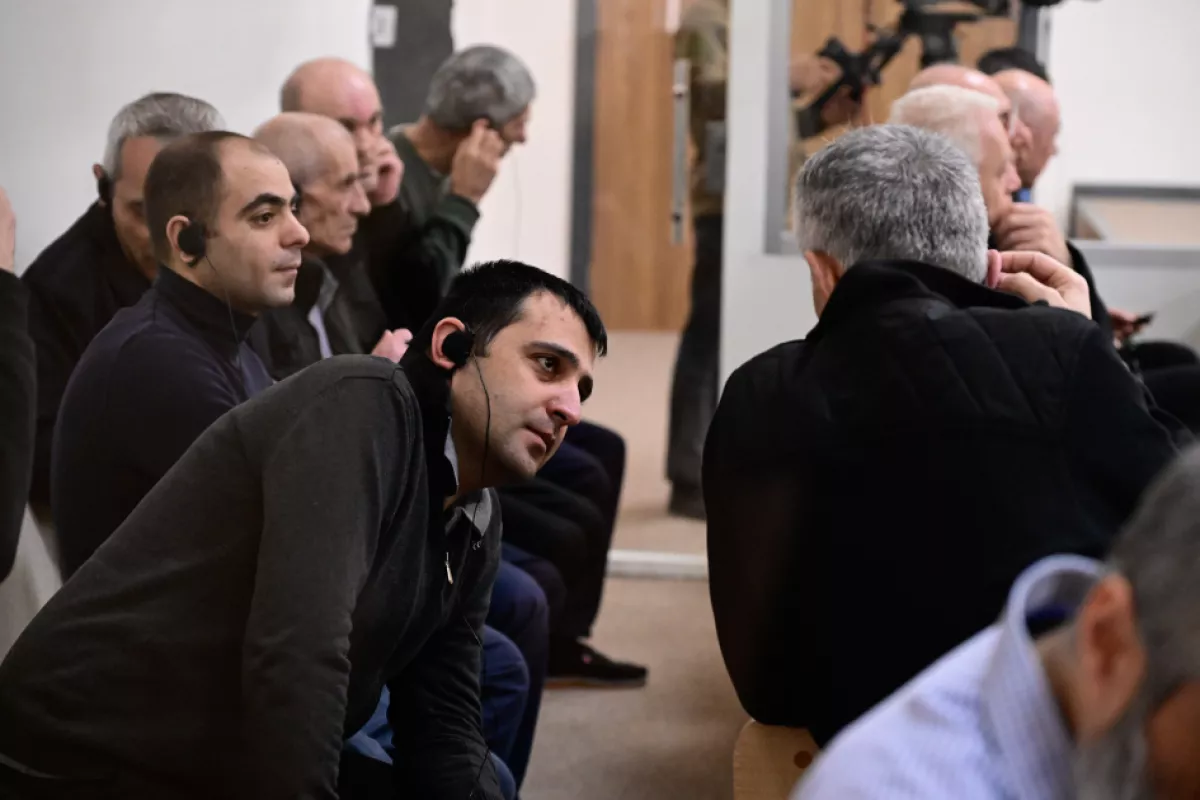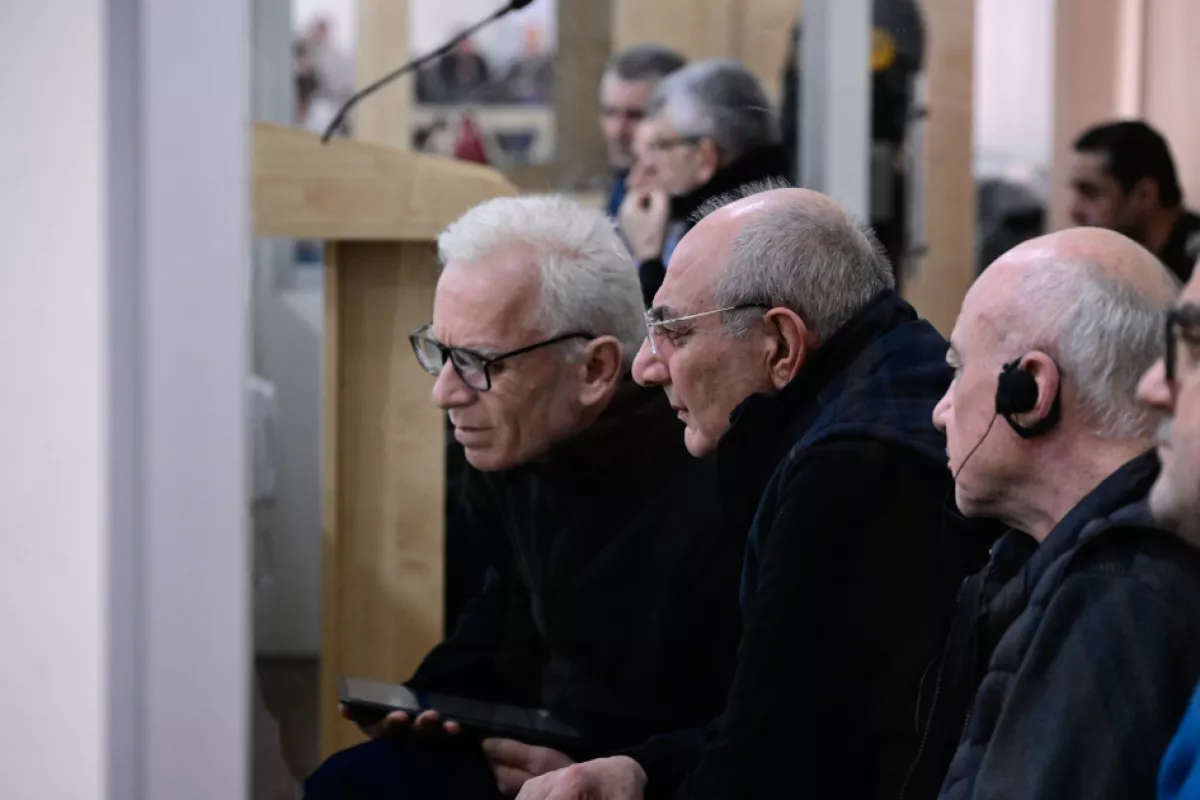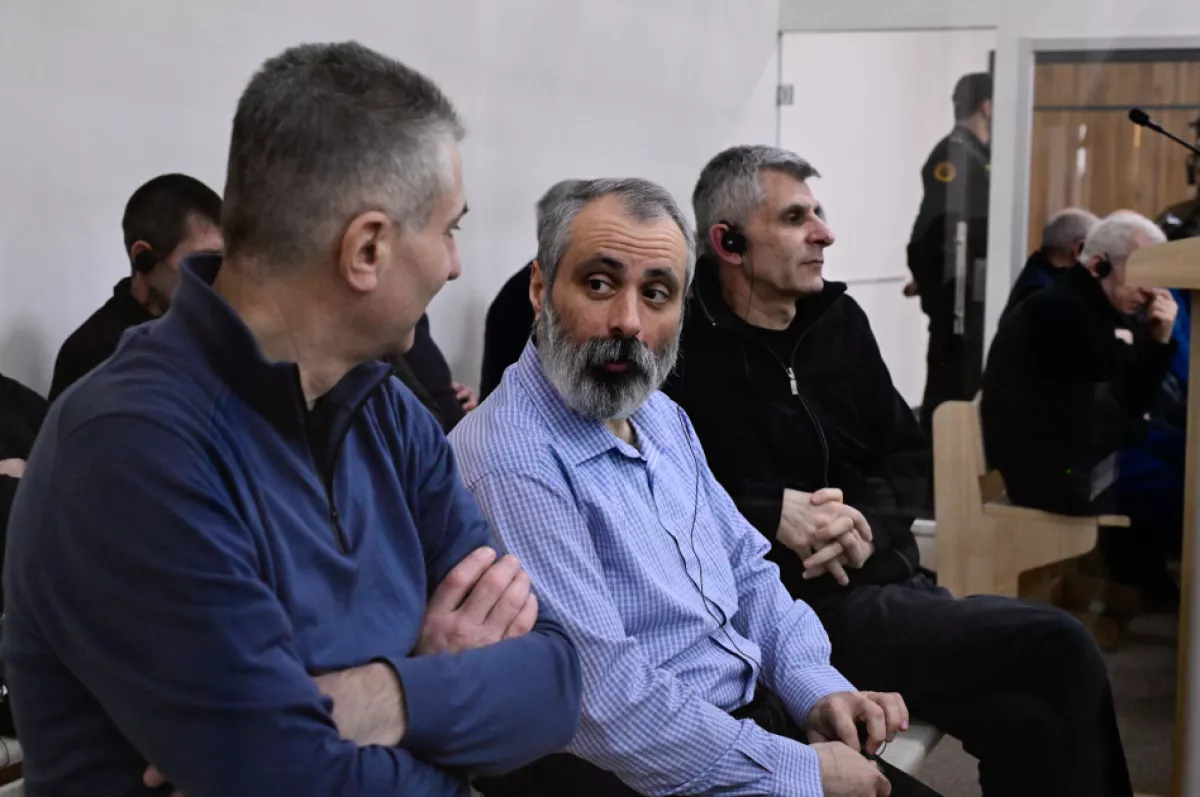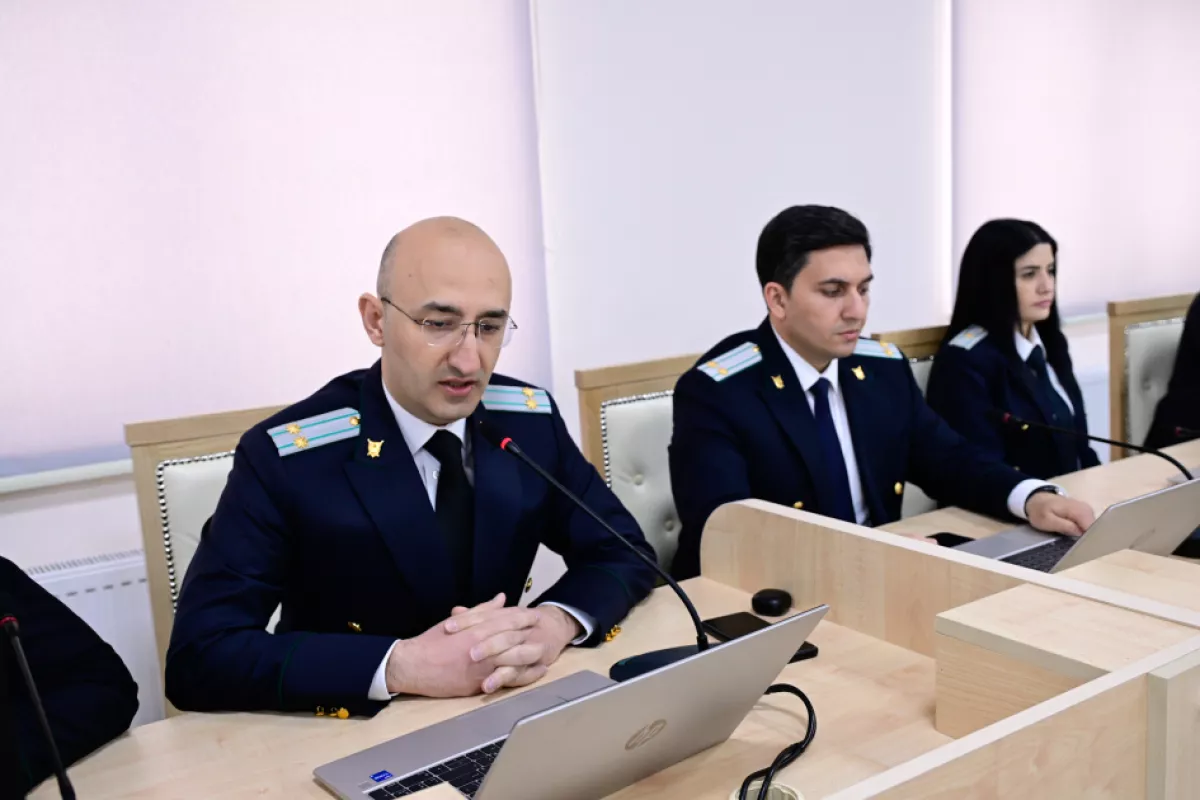Arayik Harutyunyan: Azerbaijanis did not leave their homes voluntarily Baku trial / PHOTO
Court hearings on the criminal case against citizens of the Republic of Armenia Arayik Harutyunyan, Arkadi Ghukasyan, Bako Sahakyan, Davit Ishkhanyan, Davit Babayan, Levon Mnatsakanyan and others, who are accused of committing crimes against peace and humanity, war crimes, including the preparation and conduct of a war of aggression, acts of genocide, violation of the laws and customs of warfare, as well as terrorism, financing of terrorism, forcible seizure of power, forcible retention of power and numerous other crimes as a result of Armenia's military aggression, was continued on April 14.
The hearings held at the Baku Military Court were presided over by Judge Zeynal Aghayev and a panel consisting of Jamal Ramazanov and Anar Rzayev (reserve judge Gunel Samadova). Each of the accused was provided with an interpreter into the language of their choice, as well as defense attorneys, Caliber.Az reports, citing Azertag.
Present at the hearings were the accused and their defense attorneys, some of the victims, their legal successors and representatives, as well as prosecutors in charge of public prosecution.
During the review hearing, Senior Assistant to the Prosecutor General Vusal Aliyev disclosed documents collected during the preliminary investigation into the occupation of the sovereign territories of Azerbaijan by Armenia, including the protocols of inspection of crime scenes, photo materials, victim and witness testimonies, as well as accounts of Armenians interrogated as suspects and accused persons during the preliminary investigation in the early 1990s. Also disclosed were expert opinions.
It was noted that on September 19, 1988, a criminal case was initiated by Senior Assistant to the Prosecutor General of the Union of Soviet Socialist Republics (USSR), State Counselor of Justice of the 2nd degree Nikolayev in connection with the various crimes committed by Armenians in the Azerbaijani territories of Khojaly, Shusha and Khankendi under a relevant article of the Criminal Code of the Azerbaijan Soviet Socialist Republic, and the preliminary investigation was entrusted to the investigation group of the USSR Prosecutor General's Office.
According to the testimony of Artur Abramyan, who was interrogated as a witness in a criminal case initiated by the USSR Prosecutor General's Office, the rally in Karabakh was led by Arkady Manucharov, Zori Balayan, Genrikh Poghosyan, Maksim Babayan, the head of the construction department Roles Aghajanyan, Vladik Sargsyan and other individuals he had not met before. Murad Petrosyan and Serzh Sargsyan, in accordance with an agreement between them, carried out the arming of illegal Armenian armed groups in Karabakh.
In addition, the illegal Armenian armed groups operating in the territories of Azerbaijan received financial assistance from Yerevan, the deputy chairman of the Supreme Council of Armenia, Ter-Petrosyan, sent the funds to the territories of Azerbaijan through his people, while Robert Kocharyan received and distributed these funds among the illegal Armenian armed groups in the territories of Azerbaijan. Murad Petrosyan issued the order to blow up the bridge over the Khalfalichay river at the 14th kilometer of the Shusha-Khankendi highway.
As part of the criminal case, Samvel Babayan, who was the “defense minister” and “secretary of the Security Council” of the self-styled republic established in the sovereign territories of Azerbaijan occupied by Armenia, said in his statements as a suspect and accused during the preliminary investigation in 1990-1991 that Samvel Bagmanyan, who blew up a passenger bus on the Yevlakh-Lachin highway in April 1991, was a member of the illegal Armenian armed groups led by Murad Petrosyan. Murad Petrosyan was a member of Robert Kocharyan's team.
Yuriy Jahangiryan, who was interrogated as a witness, said in his testimony that Robert Kocharyan, who worked as a party secretary at the Karabakh Silk Factory, was an active member of the Armenian nationalist organization called “Krunk” and began to propagate the ideas of national hatred and enmity against Azerbaijanis. After that, the court hearing continued with prosecutors asking questions of the accused.
The accused Arkadi Ghukasyan asked the court to give him time until the next hearing to answer the questions of the prosecutors regarding the disclosed statements and other evidence.
The presiding judge took into account his request and said he would be given the opportunity to answer the questions at the next hearing.
Answering the questions of the Senior Assistant to the Prosecutor General Vusal Aliyev, as well as public prosecutors Fuad Musayev and Vusal Abdullayev, Arayik Harutyunyan said that Robert Kocharyan, Murad Petrosyan, Manuchuryan and others were the organizers of rallies in the previously occupied territories of Azerbaijan in the 1990s and were the ones who led the “movement”. He said that he also remembered Azerbaijanis living in Khankendi leave their homes in 1988-1990. He added, “I also remember the blowing up of the bridge (the bridge over the Khalfalichay river – ed.).
Arayik Harutyunyan said he had heard about the burning of Azerbaijani homes on some street, killings and robberies. However, the accused claimed that he was unaware of the scale of the events that were disclosed in court. He said, “I did not know that there were so many murders and violence. I was also unaware of the opening of criminal cases. I did hear and see that there were certain problems with Azerbaijanis moving around in Khankendi, for example, buying something from a shop. As for the Azerbaijanis leaving their homes, it is clear that they did not do it of their own accord.”
The accused also confirmed the fact of killings. “Yes, there were many killings, there were even facts where Armenians killed Armenians. That is, Armenians were not only against Azerbaijanis, there were cases of Armenians killing Armenians on domestic and political grounds. In Khankendi, they killed a high-ranking official in Karabakh.”
Arayik Harutyunyan also revealed the name of the official killed in Khankendi. He said, “His name was Valery Grigorian. There are different theories of his murder. One was that he went to Baku and met with Azerbaijanis. The second theory was that he was killed for his work. The fact was that he was killed after returning from Baku, this was the first theory.”
During the interrogation, Arayik Harutyunyan also spoke about an attempted assassination on Arkady Ghukasyan by Samvel Babayan in 2000. He said he was appointed “secretary” of the “Security Council” by force.
Arayik Harutyunyan said he had met Murad Petrosyan after 2010-2012. “Before that, I had heard about him. He died a few years ago. Petrosyan and I were not on the same team. He was against me. We were on the opposite sides of the barricade.”
Then the hearing examined one document. According to the document, Arayik Harutyunyan expressed his condolences over Murad Petrosyan’s death, wrote kind words about him, and highly appreciated his activities.
In response to questions from Assistant to the Prosecutor General for Special Assignments Tugay Rahimli and Head of the Department of Public Prosecution of the Prosecutor General's Office Nasir Bayramov, the accused Levon Mnatsakanyan said he had heard about the explosion of the bridge over the Khalfalichay river. He also said that he had no contact with Murad Petrosyan. He added, “He was defending the protesters who had blocked the road in Khankendi in 2020.”
Then public prosecutor Tarana Mammadova asked questions of Bako Sahakyan and David Ishkhanyan.
The accused Bako Sahakyan said he condemned the explosion of the bridge. “I am opposed to and condemn such actions.”
Answering questions, the accused Davit Ishkhanyan said he was unaware of the Khalfalichay bridge explosion, noting that he had heard about it for the first time in court.
Then the hearing moved to the announcement of the protocols of inspection of the scene on the Baghanis-Ayrim episode, the testimonies of victims and their legal successors, as well as expert opinions.
The next hearing is scheduled for April 17.
To recap, a total of 15 Armenian nationals are being charged with numerous crimes involving direct leadership and participation of the Armenian state, its state bodies, military forces and illegal armed formations, verbal and written instructions, orders and assignments, provision of material and technical support, central governance, as well as the exercise of rigorous control, with the aim of committing military aggression and acts of terror against the Republic of Azerbaijan in the territory of Azerbaijan in violation of domestic and international law, and involving Robert Sedraki Kocharyan, Serzh Azati Sargsyan, Vazgen Mikaeli Manukyan, Vazgen Zaveni Sargsyan, Samvel Andraniki Babayan, Vitali Mikaeli Balasanyan, Zori Hayki Balayan, Seyran Mushegi Ohanyan, Arshavir Surenovich Garamyan, Monte Charles Melkonyan and others, including criminal acts committed during the course of the war of aggression waged by the aforementioned criminal group.
The said persons, i.e. Arayik Vladimiri Harutyunyan, Arkadi Arshaviri Ghukasyan, Bako Sahaki Sahakyan, Davit Rubeni Ishkhanyan, David Azatini Manukyan, Davit Klimi Babayan, Levon Henrikovich Mnatsakanyan, Vasili Ivani Beglaryan, Erik Roberti Ghazaryan, Davit Nelsoni Allahverdiyan, Gurgen Homeri Stepanyan, Levon Romiki Balayan, Madat Arakelovich Babayan, Garik Grigori Martirosyan, Melikset Vladimiri Pashayan, are being charged under Articles 100 (planning, preparing, initiating and waging a war of aggression), 102 (attacking persons or organizations enjoying international protection), 103 (genocide), 105 (extermination of the population), 106 (enslaving), 107 (deportation or forced displacement of the population), 109 (persecution), 110 (enforced disappearance of people), 112 (deprivation of liberty contrary to international law), 113 (torture), 114 (mercenary service), 115 (violation of the laws and customs of warfare), 116 (violation of international humanitarian law during armed conflict), 118 (military robbery), 120 (intentional murder), 192 (illegal entrepreneurship), 214 (terrorism), 214-1 (financing terrorism), 218 (creation of a criminal association (organization)), 228 (illegal acquisition, transfer, sale, storage, transportation and possession of weapons, their components, ammunition, explosives and devices), 270-1 (acts threatening aviation security), 277 (assassination of a state official or public figure), 278 (forcible seizure and retention of power, forcible change of the constitutional structure of the state), 279 (creation of armed formations and groups not provided for by law) and other articles of the Criminal Code of the Republic of Azerbaijan.




